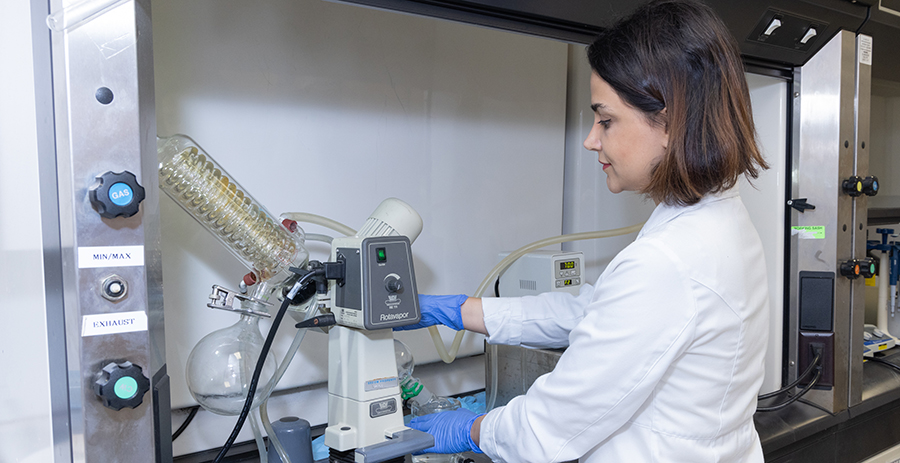
M.S. in Pharmaceutical Sciences
Discover how a Master’s in Pharmaceutical Sciences can improve your leadership skills, open doors to a higher salary, enhance your research skills, and more. At Nova Southeastern University Barry and Judy Silverman College of Pharmacy, you’ll have the opportunity to improve your career and the lives of your future patients.
This two-year graduate program offers three specialized areas of expertise to choose from:
- Drug Development (Pharmaceutics), focusing on drug delivery to the desired target;
- Molecular Medicine and Pharmacogenomics, centering on drug delivery principles; or
- Social and Administrative Pharmacy, concerned with the interface between pharmacy and society.
Upon successful completion of the M.S. in Pharmaceutical Sciences degree, you'll be prepared for positions in academia, or technological or managerial positions in the pharmaceutical industry, health care systems, government agencies and beyond. This program also readies you for further study in a doctoral program.
Quick Facts
TuitionVisit the Tuition and Fees page for more information. |
CurriculumNSU's M.S. in Pharmaceutical Sciences program is 36-38 credit hours to complete, dependent on chosen program sequence. |
Delivery OptionsCoursework for the M.S. in Pharmaceutical Sciences program is based at the Fort Lauderdale/Davie campus. |
Application DeadlinesApplications are accepted online and on a rolling basis. PharmGRAD application is due on July 18. |
Curriculum
The courses are representative of the overall requirements of the program at the time of publication, and are subject to change. The curriculum is revised, as needed, to meet the demands of the profession. For learning outcomes and additional information, please consult the College of Pharmacy catalog.
This sequence emphasizes the coursework, laboratory and literature research skills centering on the delivery of the drug to the desired target. A plan of study focusing on the theory and practice of incorporating drugs into the forms and formulations that best deliver the drugs to the site of the intended medical action.
Students who pursue this sequence will be under the tutelage of faculty in the department of pharmaceutical sciences, a group with expertise in pharmaceutics-related disciplines. Areas of expertise include a variety of drug formulations and novel drug delivery systems.
| CRN | Course Name | Credits |
|---|---|---|
| PHRM 5004 | Advanced Physical Pharmacy | 3 |
| PHRM 5012 | Clinical Drug Development: Adv Pharmacokinetics and Biopharmaceutics |
3 |
| PHRM 5014 | Molecular and Cellular Pharmacodynamics | 3 |
| PHRM 5030 | Biostatistics | 3 |
| PHRM 5060 | Pharmaceutical Sciences Research Design | 1 |
| PHRM 5204 | Research Techniques and Instrumentation | 3 |
| PHRM 5212 | Bioethical Principles of Life Science Research | 3 |
| PHRM 5229 | Product Development and Industrial Pharmacy | 4 |
| PHRM 5610 | Scientific Writing | 1 |
| PHRM 5700 | Research Project | 4 |
| PHRM 5701 | Graduate Seminar* | 4 |
| PHRE | Electives | 6 |
*repeatable course
This sequence emphasizes the coursework, laboratory and literature research skills centering on drug discovery principles, including determining the mechanisms, extent and character of drug actions.
Students who pursue this sequence will be under the tutelage of faculty in the department of pharmaceutical sciences, a group with expertise in areas such as:
- pharmacology
- medicinal chemistry
- toxicology
- biochemistry.
Particular areas of expertise include cardiovascular disease, cancer, and autism with research focus in these areas.
| CRN | Course Name | Credits |
|---|---|---|
| PHRM 5004 | Advanced Physical Pharmacy | 3 |
| PHRM 5012 | Clinical Drug Development: Adv Pharmacokinetics and Biopharmaceutics |
3 |
| PHRM 5014 | Molecular and Cellular Pharmacodynamics | 3 |
| PHRM 5020 | Advanced Pharmacogenomics and Molecular Medicine | 3 |
| PHRM 5030 | Biostatistics | 3 |
| PHRM 5060 | Pharmaceutical Sciences Research Design | 1 |
| PHRM 5204 | Research Techniques and Instrumentation | 3 |
| PHRM 5212 | 3 | |
| PHRM 5610 | Scientific Writing | 1 |
| PHRM 5700 | Research Project | 4 |
| PHRM 5701 | Graduate Seminar* | 4 |
| PHRE | Electives | 6 |
*repeatable course
This sequence emphasizes the coursework and literature research skills centering on the interface between pharmacy and society (pharmacy outcomes). A plan of study focuses on the various facets of the practitioner-patient interface, with emphasis on gerontology and ethnic experience.
Students in this sequence will be under the tutelage of faculty in the department of sociobehavioral and administrative pharmacy, a group with expertise in:
- pharmacoeconomics
- health disparities and vulnerable populations
- cultural competency
- development and implementation of sustainable pharmacy services
- patients' decision making
- pharmacy marketing
- assessment management and risk reduction
| CRN | Course Name | Credits |
|---|---|---|
| PHRM 5001 | Health Economics | 3 |
| PHRM 5021 | Population Health & Public Policy | 3 |
| PHRM 5025 | Pharmacy Management and Finance | 3 |
| PHRM 5030 | Biostatistics | 3 |
| PHRM 5203 | Social Measurement and Techniques | 3 |
| PHRM 5209 | Pharmacoeconomics | 3 |
| PHRM 5211 | Theories of Health-Seeking Behavior | 3 |
| PHRM 5212 | Bioethical Principles of Life Science Research | 3 |
| PHRM 5610 | Scientific Writing | 1 |
| PHRM 5700 | Research Project | 4 |
| PHRM 5701 | Graduate Seminar* | 4 |
| PHRE | Elective | 3 |
*repeatable course